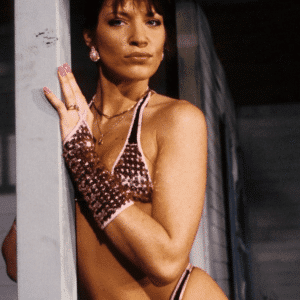Alain Delon, born on November 8, 1935, in the suburbs of Paris, rose to become one of the most iconic figures in European and Hollywood cinema. However, his journey to stardom was far from glamorous. Delon’s childhood was defined by instability and struggle, as his parents separated when he was only three years old.
His father operated a cinema hall, while his mother worked as a pharmacist before becoming a cashier. Both remarried, leaving young Alain shuffled between two families. Initially, he adapted to the dual households, but the emotional toll soon surfaced. Feelings of neglect grew stronger as his mother and stepfather focused on their butcher shop, often leaving him in the care of a nanny.
This tumultuous start shaped Delon’s rebellious nature—a trait that would follow him throughout his youth.
School Troubles: The Rebellious Young Alain

Alain Delon was never a model student. His behavior frequently got him expelled from schools, and his academic performance was lackluster. Teachers struggled to control him, leading to a series of moves between institutions. For Delon, school felt more like a battleground than a place of growth.
Despite his issues in the classroom, Delon showed early signs of talent. He played the piano well and even earned praise for his musical abilities. Yet, his interest in the arts was short-lived, and he quickly abandoned it, seeking excitement in other pursuits.
This restless energy defined his teenage years, pushing him toward unconventional paths.
Finding Purpose: From Butcher’s Apprentice to Soldier
Following his troubled school years, Delon trained as a butcher, working alongside his stepfather. But after just three months, he realized this life wasn’t for him. He drifted through odd jobs, including stints in stores and cafes, constantly searching for purpose.
At 17, Delon joined the French Navy, serving in Indochina during the First Indochina War. The military brought both discipline and hardship. The experience was grueling, but it hardened Delon, instilling in him the resilience and focus that would later define his career.
Returning to France after his service, Delon worked as a waiter to make ends meet. Though the future looked uncertain, fate had other plans for the young man whose charisma and looks were impossible to ignore.
The Discovery: Alain Delon’s Rise to Stardom
Alain Delon’s life took a dramatic turn when his striking good looks caught the attention of talent scouts. At a time when cinema was celebrating charisma and rugged charm, Delon seemed made for the silver screen. His natural magnetism and brooding intensity set him apart, despite having no formal training in acting.
In 1958, Delon landed his breakout role in Christine, starring alongside the beloved Romy Schneider. Their on-screen chemistry captivated audiences and established Delon as an actor to watch.
From there, his career skyrocketed. Delon delivered unforgettable performances in classic films such as Purple Noon (1960), The Leopard (1963), and Le Samouraï (1967). His portrayal of complex, morally ambiguous characters resonated with viewers, earning him recognition as one of the finest actors of his generation.
Delon’s career wasn’t confined to French cinema. His appeal transcended borders, making him a beloved figure in both European and Hollywood films.
Personal Struggles: Health and Family Challenges

Despite his professional triumphs, Delon’s personal life was marked by difficulties. In June 2019, he suffered a stroke, an event that signaled the beginning of his health decline. He spent time recovering in a Swiss hospital before retreating from public life.
By 2022, Delon began treatment for slow-progressing lymphoma. Unfortunately, by mid-2023, his condition worsened, and his children made the difficult decision to halt treatment to preserve his quality of life.
Family feuds complicated Delon’s final years. His three children—Anthony, Anouchka, and Alain-Fabien—clashed over his care and legacy. While they united against external threats, internal tensions often surfaced, adding strain to an already fragile period.
The Final Days: A Peaceful Goodbye

On August 18, 2024, Alain Delon passed away peacefully at his home in Douchy, surrounded by loved ones. At 88 years old, he had lived a life marked by unparalleled success, personal battles, and artistic achievement. His passing marked the end of an era, but his legacy remains etched in the annals of cinematic history.
A Lasting Legacy: Alain Delon’s Impact on Cinema

Alain Delon’s story is one of perseverance, charisma, and unshakable resilience. From a childhood riddled with instability to a rebellious youth and eventual stardom, Delon’s journey is a testament to the power of grit and determination.
His performances in films like Le Samouraï redefined what it meant to be a leading man—bringing intensity, vulnerability, and complexity to the screen. He wasn’t just a handsome face; he was a master of his craft, capable of captivating audiences with subtle expressions and raw emotion.
Delon’s influence on cinema extends beyond his films. He became a cultural icon, representing the elegance and intensity of French and European cinema during its golden age.
Conclusion: The Timeless Appeal of Alain Delon

Alain Delon’s life was far from ordinary. Rising from the ashes of a troubled childhood, he became one of the most celebrated actors of his time. His charisma, talent, and ability to transform personal hardship into artistic brilliance cemented his place in history.
While his final years were marred by health struggles and family tensions, his legacy endures. Delon’s timeless performances, rebellious spirit, and unforgettable screen presence ensure he will always be remembered as one of cinema’s great legends.
As the world reflects on his extraordinary life, one thing is clear: Alain Delon was more than an actor—he was a symbol of perseverance and artistry, a star whose light will shine for generations to come.


